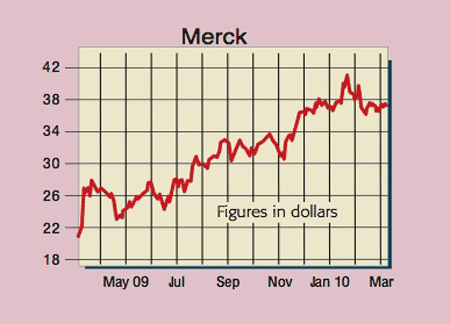
Firms undergoing change often have their stocks marked down unfairly. Take Merck, the world’s second-largest pharmaceutical firm. Due to concerns over patent expiries and President Obama’s proposed healthcare reforms, the shares have been sold off. And that makes them a bargain. Here’s why.
The group is a medical titan, benefiting from best-in-class science and a vast knowledge bank of research and development (R&D). Indeed, it spends 19% of turnover (or $8.5bn) on R&D alone and enjoys leading positions for vaccines and pain relief and treatments for Alzheimer’s, cardiovascular disease, diabetes, obesity, cancer, and sleep disorders. Each of its top ten blockbuster drugs generates sales of more than $1bn.
Secondly, on 3 November, Merck bought Schering-Plough for $41.1bn. This transformational stock (56%) and cash (44%) deal added coveted franchises to its product portfolio in biologics, consumer healthcare (Claritin allergy pills and Coppertone suncare) and animal health.
Merck (NYSE: MRK), rated a BUY by Standard and Poor’s
Better still, the combined pipeline is now one of the strongest in the sector – it includes 43 new compounds in mid- or late-stage human testing. All of these innovative treatments have excellent prospects. However, the firm’s single stand-out strength is in vaccines, including drugs such as Gardasil, aimed at preventing cervical cancer.
Over the past 20 years, this sector has consolidated into a few major players, such as Roche, GlaxoSmithKline and Pfizer. This has created a semi-oligopoly with resilient pricing power. At the same time, the science behind treatments is advancing rapidly, creating new opportunities. Historically, vaccines were mostly derived from micro-organisms. However, with the deciphering of the human genome, researchers can now map specific viruses and target their DNA structures more precisely. These substances generally have fewer side-effects. Nevertheless, they produce equally lucrative profit margins because lower marketing expenses tend to offset higher manufacturing costs.
Wall Street is forecasting 2010 revenues and underlying earnings per share (EPS) of $46.0bn and $3.42 respectively, increasing to $46.2bn and $3.94 in 2011. This puts the shares on attractive price/earnings (p/e) ratios of 10.7 and 9.3. This industry giant also sports a rock-solid balance-sheet with only $8.1bn of net debt, representing less than half of its projected 2010 earnings before interest, tax, depreciation and amortisation (Ebitda).
In the future, the board believes it can increase earnings by high single-digits from 2009 to 2013 by launching new therapies and realising cost savings from the recent merger. Indeed, $3.5bn per year of synergies have already been targeted by the end of 2012. These will come from a 15% cut in staff in the sales, administrative and head office areas, as well as from the consolidation of manufacturing and R&D.
So what are the potential pitfalls? The successful integration of Schering-Plough is the board’s top priority. Like its peers, Merck too is exposed to the usual issues over patent challenges, regulatory scrutiny, tighter government spending and possible pipeline setbacks. All the same, with a cheap rating and an R&D cabinet stuffed with innovations, the firm is well placed to benefit from the trends of ageing populations and greater consumption by emerging markets. Standard & Poor’s has a $48 share price target.
Recommendation: LONG-TERM BUY at $36.75
• Paul Hill also writes a weekly share-tipping newsletter, Precision Guided Investments